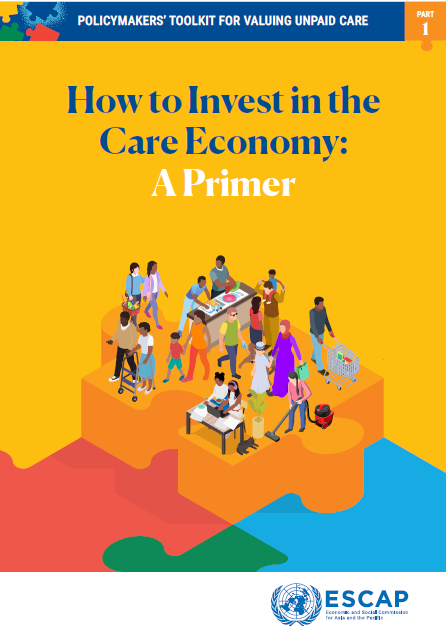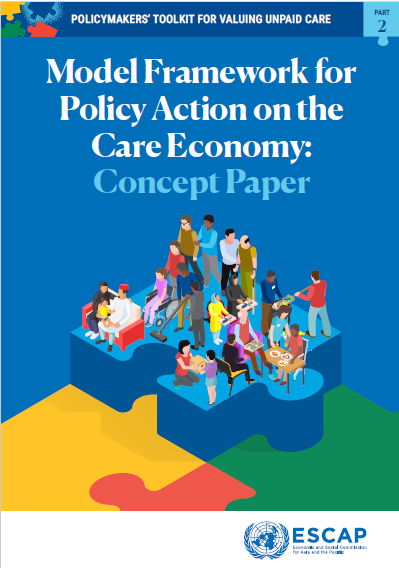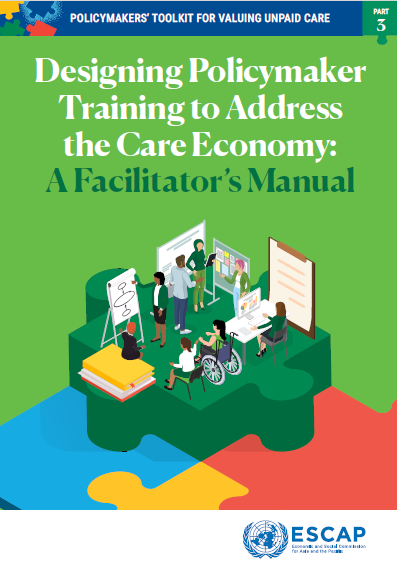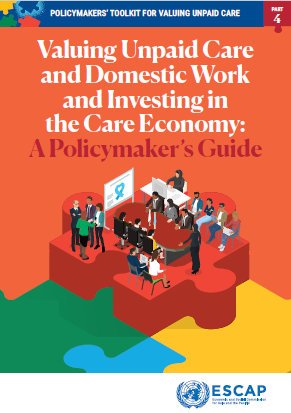
How to Invest in the Care Economy: A Primer
How to Invest in the Care Economy: A Primer serves as the first publication in ‘A Policymaker’s Toolkit for Valuing Unpaid Care and Domestic Work and Investing the Care Economy’. The primer is designed to support policymakers and government officials in their efforts to achieve Sustainable Development Goal 5 on gender equality and empowerment of women in their countries. It lays out the basic concepts relating to what is called the “care economy” — the sum total of all paid and unpaid care work. It highlights the implications of a lopsided and gendered division of labour in unpaid care and domestic work. This strengthens the case for governments to invest in the care economy by addressing four care policy categories — care infrastructure, care-related social protection, care services and employmentrelated care. The primer includes the normative principles and levers of change that will help policymakers and practitioners to create a policy ecosystem that values care work and promotes women’s empowerment.

Model Framework for Policy Action on the Care Economy: Concept Paper
The Model Framework for Policy Action on the Care Economy: Concept Paper serves as the second publication in ‘A Policymaker’s Toolkit for Valuing Unpaid Care and Domestic Work and Investing the Care Economy. Building on the conceptual framework defined in the first publication and ESCAP’s empirical efforts to address care needs, this concept paper introduces the Model Framework for Policy Action on the Care Economy (MFA) for the Asia and Pacific region. It aims to empower policymakers and development practitioners to ask critical questions and gather relevant data for crafting evidence-led, care-sensitive, and gender-transformative policies. The framework comprises four components: the political economy of care, normative principles of care, levers of change, and the policy categories of care, which draw on the first publication’s delineations. The paper establishes assessment criteria for each component, enabling policy leaders to operationalize a commitment to the Right to Give and Receive Care. The flexible nature of the assessment questions allows for policy actions to be tailored to national, regional, and local needs.

Designing Policymaker Training to Address the Care Economy: A Facilitator’s Manual
Designing Policymaker Training to Address the Care Economy: A Facilitator’s Manual serves as the third publication in ‘A Policymaker’s Toolkit for Valuing Unpaid Care and Domestic Work and Investing the Care Economy. The manual serves as a comprehensive guide for facilitators responsible for implementing and training relevant staff within their ministry or department. It is designed to assist facilitators in developing a training program that empowers policymakers and government officials to understand and incorporate the care economy into national policy frameworks. Building on the theoretical frameworks outlined in the first publication and utilizing the MFA discussed in the second, this manual offers a clear, step-by-step approach to conducting effective training and consultation sessions. It includes a comprehensive set of tools and templates that aid in the preparation and execution of sessions designed to foster critical thinking and stimulate the formulation of evidence-based, gender-transformative policies.

Valuing Unpaid Care and Domestic Work and Investing in the Care Economy: A Policymaker’s Guide
The final publication in the toolkit, Valuing Unpaid Care and Domestic Work and Investing in the Care Economy: A Policymaker’s Guide, serves as an inter-ministerial guide for implementing the MFA. This guide is strategically crafted to directly support policymakers, especially those within ministries of women's affairs and related governmental departments, in effectively organizing and conducting national consultations on the care economy, fostering alliances with other line ministries. Tailored to support a comprehensive three-day consultation process, the guide is structured into phases: conceptual introduction, targeted consultations, and strategic planning. Each phase is designed to help ministries identify policy entry points, establish shared principles, and develop cohesive action plans tailored to their specific contexts.

